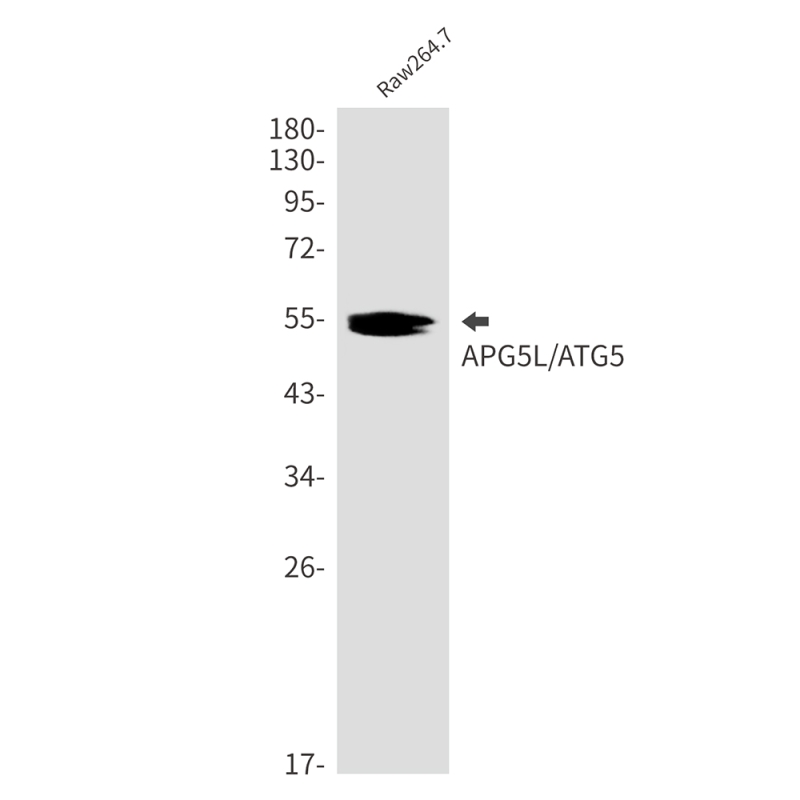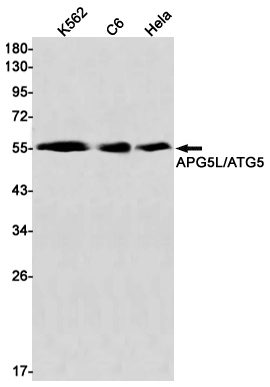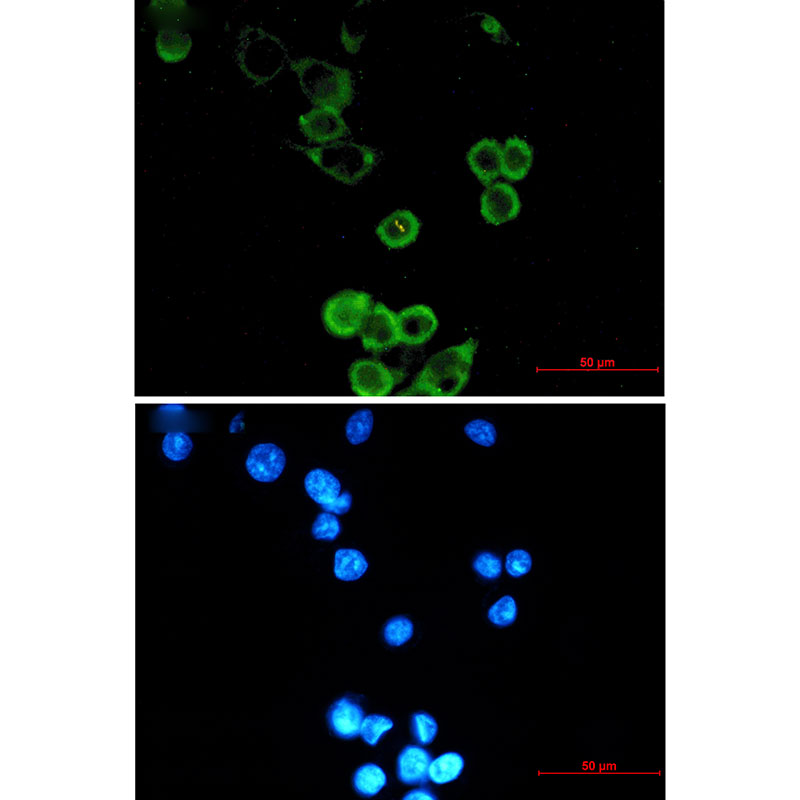


| WB | 咨询技术 | Human,Mouse,Rat |
| IF | 1/20 | Human,Mouse,Rat |
| IHC | 咨询技术 | Human,Mouse,Rat |
| ICC | 1/50-1/200 | Human,Mouse,Rat |
| FCM | 咨询技术 | Human,Mouse,Rat |
| Elisa | 咨询技术 | Human,Mouse,Rat |
| Aliases | APG 5L; APG5; APG5 autophagy 5 like; APG5 like; APG5-like; Apoptosis specific protein; ASP; ATG 5; ATG5 autophagy related 5 homolog; Autophagy protein 5; hAPG5 |
| Entrez GeneID | 9474 |
| WB Predicted band size | Calculated MW: 32 kDa; Observed MW: 55 kDa |
| Host/Isotype | Rabbit IgG |
| Antibody Type | Primary antibody |
| Storage | Store at 4°C short term. Aliquot and store at -20°C long term. Avoid freeze/thaw cycles. |
| Species Reactivity | Human,Mouse,Rat |
| Immunogen | A synthetic peptide of human APG5L/ATG5 |
| Formulation | Purified antibody in TBS with 0.05% sodium azide,0.05%BSA and 50% glycerol. |
+ +
以下是3篇与APG5L(即Atg5)抗体相关的经典文献,涵盖其功能验证与应用:
---
1. **文献名称**:*The role of Atg5 in autophagy regulation and disease progression*
**作者**:Mizushima, N., Yoshimori, T., & Levine, B.
**摘要**:本文系统综述了Atg5在自噬体形成中的核心作用,并详细描述了针对Atg5抗体的应用(如Western blot和免疫荧光),证明其在小鼠模型中检测自噬活性的有效性。
---
2. **文献名称**:*Essential role for autophagy protein Atg5 in cellular senescence and mitochondrial homeostasis*
**作者**:Kuma, A., et al.
**摘要**:研究利用Atg5特异性抗体(通过基因敲除验证抗体特异性),揭示Atg5缺失导致线粒体功能障碍和细胞衰老,强调了该抗体在细胞生物学研究中的可靠性。
---
3. **文献名称**:*Monitoring autophagy by Atg5 antibody: A comparison with LC3-based assays*
**作者**:Yoshii, S.R., & Mizushima, N.
**摘要**:本文对比了Atg5抗体与LC3抗体在监测自噬过程中的灵敏度与特异性,证实Atg5抗体适用于检测自噬通量,尤其在基因敲除或过表达实验中。
---
**备注**:APG5L(即Atg5)是自噬相关蛋白,上述文献均使用其特异性抗体解析自噬机制,适用于分子生物学及疾病模型研究。如需具体DOI或发表年份,可进一步补充检索。
The APG5L (Autophagy Protein 5-Like) antibody is designed to target the APG5L protein, also known as ATG5. a critical component of the autophagy pathway. Autophagy is a conserved cellular process responsible for degrading damaged organelles, misfolded proteins, and pathogens via lysosomal machinery. ATG5 plays a pivotal role in autophagosome formation by conjugating with ATG12 to form an E3-like ubiquitin ligase complex, which facilitates the lipidation of LC3 (ATG8) and subsequent membrane elongation of autophagic vesicles. Dysregulation of ATG5-mediated autophagy is implicated in various diseases, including cancer, neurodegenerative disorders (e.g., Alzheimer’s and Parkinson’s), and infectious diseases.
The APG5L antibody is widely used in research to study autophagy dynamics, monitor autophagic flux, and explore disease mechanisms. It enables detection of ATG5 expression through techniques like Western blotting, immunofluorescence, and immunohistochemistry in cell lines, tissues, or primary samples. Researchers also utilize this antibody to investigate the interplay between autophagy and apoptosis, as ATG5 can paradoxically promote cell survival under stress or trigger apoptosis under certain conditions. Commercial APG5L antibodies are typically validated for specificity against human, mouse, or rat homologs, with applications in both basic and translational studies aiming to modulate autophagy for therapeutic purposes. Its utility extends to screening autophagy-modulating drugs and validating genetic models (e.g., ATG5 knockout cells).
×